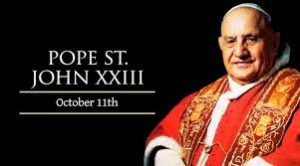HOMILY WEEK 28 02 – Year II
Genuine Faith Expressed Through Selfless Love:
Optional Memorial of St. Pope John XXIII
(Gal 5:1-6; Ps 119; Lk 11:37-41)
***************************************************
“For freedom Christ has set us free” and “Give for alms those things that are within.”
These two quotes from the readings today focus our attention on this message: our faith in Christ, to be real and genuine, must express itself through heartfelt love, and freedom from any slavish dependence on external factors for our dignity and self-worth.
St. Paul, in his letter to the Galatians, is very direct in his teaching that Jesus has truly set us free from any need to justify ourselves, try to save ourselves or make ourselves holy. As he asserts boldly, all that really matters is that we express our faith in Jesus Christ by selfless, even unconditional love.
The gospel is a perfect fit for that strong message from Paul, as we see Jesus actually taking great liberty and neglecting to “wash his hands” which was an important ritual requirement to the orthodox Jews of his day. The Pharisee, quite understandably, was amazed and I would think even shocked and scandalized that Jesus, of all people, would blatantly ignore that cultic ritual.
The reason he did becomes quite clear as Jesus uses that gesture to point out to his host that the Pharisees outwardly observe many rules and laws, but inside are full of painful emotions like anger, jealousy and insecurity, as well as negative attitudes like false pride, stubborn self-will and self-righteousness, plus addiction to possession, prestige and power. So, what is more important, looking good by washing one’s hands, or making the painful, humble inner journey into one’s self to deal with one’s own faults and failings, which no one, including ourselves, ever finds easy to do?
Things Hidden is the title of a book on spirituality written by Richard Rohr OFM. It could be the title of this homily, as we are invited to make that most challenging journey of all, from our heads to our hearts, to greater self-awareness and to a deeper discernment of what should be in our hearts that we could give as alms, things such as: genuine solid faith in Jesus Christ as our Lord and Savior; an awareness of being beloved sons and daughters of God, as Henri Nouwen claims; a corresponding sincere spirit of repentance and sorrow for our sins, like Peter when he first met Jesus; a spirit of humility that is able to accept ourselves as we are, as well as a spirit of simplicity and patience. Are not these “things hidden” precisely the opposite of the externalism and hypocrisy that so characterized the Pharisees and religious leaders of Jesus’ day?
 Today we celebrate a relatively recent optional memorial, that of Saint Pope John XXIII, who was born Angelo Giuseppe Roncalli in 1881. At the death of Pius XII, he was elected Pope on October 28, 1958, taking name of John XXIII. His pontificate, which lasted less than five years, presented him to the entire world as an authentic image of the Good Shepherd. Meek and gentle, enterprising and courageous, simple and active, he carried out the Christian duties of the corporal and spiritual works of mercy: visiting the imprisoned and the sick, welcoming those of every nation and faith, bestowing on all his exquisite fatherly care. His social teaching in the encyclicals Pacem in Terris and Mater et Magistra was deeply appreciated.
Today we celebrate a relatively recent optional memorial, that of Saint Pope John XXIII, who was born Angelo Giuseppe Roncalli in 1881. At the death of Pius XII, he was elected Pope on October 28, 1958, taking name of John XXIII. His pontificate, which lasted less than five years, presented him to the entire world as an authentic image of the Good Shepherd. Meek and gentle, enterprising and courageous, simple and active, he carried out the Christian duties of the corporal and spiritual works of mercy: visiting the imprisoned and the sick, welcoming those of every nation and faith, bestowing on all his exquisite fatherly care. His social teaching in the encyclicals Pacem in Terris and Mater et Magistra was deeply appreciated.
He convoked the Roman Synod, established the Commission for the Revision of the Code of Canon Law and summoned the Second Vatican Council. He was present as bishop in his Diocese of Rome through his visitation of the parishes, especially those in the new suburbs. The faithful saw in him a reflection of the goodness of God and called him “the good Pope.” He was sustained by a profound spirit of prayer. He launched an extensive renewal of the Church, while radiating the peace of one who always trusted in the Lord. Pope John XXIII died on the evening of June 3, 1963, in a spirit of profound trust in Jesus and of longing for his embrace. He was canonized April 27, 2014, along with St. John Paul II.
The Eucharist is our greatest prayer and a wonderful way to celebrate our faith in the resurrection. We believe that the crucified-risen victim is present in each of us, in the Word that is proclaimed, and in the event of the Eucharist making present to us the unconditional love Jesus revealed on the cross.
May our celebration today, consecrate and set us apart in even deeper ways, to go out and express our faith in Jesus through acts of selfless love.



